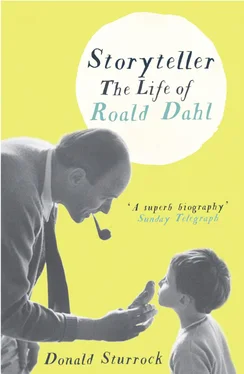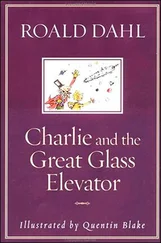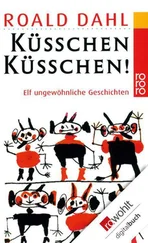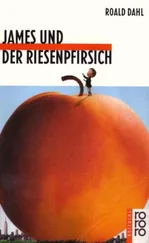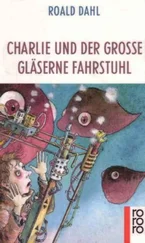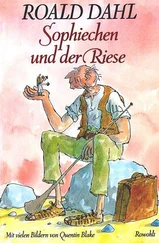In these miniature canvases, Dahl began to hone his idiosyncratic talent for interweaving truth and fiction. It would be pedantic to list the inaccuracies in Boy or its successor Going Solo. Most of them are unimportant. A grandfather confused with a great-grandfather, a date exaggerated, a slip in chronology, countless invented details. Boy is a classic, not because it is based on fact but because Dahl had a genius for storytelling. Yet its untruths, omissions and evasions are revealing. Not only do they disclose the author’s need to embellish, they hint as well at the complex hidden roots of his imagination, which lay tangled in a soil composed of lost fathers, uncertain friendships, a need to explore frontiers, an essentially misanthropic view of humanity, and a sense of fantasy that stemmed in large part from the Norwegian blood that ran powerfully through his veins.
Norway was always important to Dahl. Though he would sometimes surprise guests at dinner by maintaining garrulously that all Norwegians were boring, he never lost his profound affection for and bond with his homeland. His mother lived in Great Britain for over fifty years, yet never renounced her Norwegian nationality, even though it sometimes caused her inconvenience — most notably when she had to live as an alien in the United Kingdom during two world wars. Although she usually spoke to her children in English and always wrote to them in her adopted language, she made sure they also learned to speak Norwegian at the same time they were learning English; and every summer she took them to Norway on holiday. Forty years later, Roald would recreate these summer holidays for his own children, reliving memories that he would later immortalize in Boy. “Totally idyllic,” was how he described these vacations. “The mere mention of them used to send shivers of joy rippling all over my skin.” 9Part of the pleasure was, of course, an escape from the rigors of an English boarding school, but for Roald the delight was also more profound. “We all spoke Norwegian and all our relations lived over there,” he wrote in Boy. “So, in a way, going to Norway every summer was like going home.” 10
“Home” would always be a complex idea for him. His heart may have sometimes felt it was in Norway, but the home he dreamed about most of the time was an English one. During the Second World War, when he was in Africa and the Middle East as a pilot and in Washington as a diplomat, it was not Norway he craved for, nor the valleys of Wales he had loved as a child, but the fields of rural England. There, deep in the heart of the Buckinghamshire countryside, he, his mother and his three sisters would later construct for themselves a kind of rural enclave: the “Valley of the Dahls”, as Roald’s daughter Tessa once described it. Purchasing homes no more than a few miles away from each other, the family lived, according to one of Roald’s nieces, “unintegrated … and largely without proper English friends”. 11For though Dahl was proud to be British and though he craved recognition and acceptance from English society, for most of his life he preferred to live outside its boundaries, making his own rules and his own judgements, not unlike his ancestor, Pastor Hesselberg.
As a result, English people found him odd. His best friend at prep school admitted that he was drawn to Roald because he was “a foreigner”. 12And he was. Though born in Britain, and a British citizen, in many ways Dahl retained the psychology of an emigre. Later in his life, people forgot that. They interpreted his behaviour through the false perspective of an assumed “Englishness”, to which he perhaps aspired, but which was never naturally his. They saw only a veneer and they misunderstood it. In truth, Roald was always an outsider, the child of Norwegian immigrants, whose native land would become for their son an imaginative refuge, a secret world he could always call his own.
As with many children of emigrants, Roald would take on the manners and identity of his adopted home with the zeal of a convert. His sister Alfhild complained that her brother did not “recognize more how strong the Scandinavian is in us as a family”. 13Ironically, however, the one British ancestor he did publicly acknowledge was the Scots patriot William Wallace. Dahl was immensely proud of the family tree that showed his direct lineage to the rebel leader who, legend has it, also stood over six foot five inches tall. Wallace had defeated the invading English armies at the Battle of Stirling Bridge in 1297, but he was to meet a grisly end at their hands eight years later, when he was captured, taken to London, and executed. The brutal details of his death would not have eluded Dahl’s antennae, which were acutely sensitive to human cruelty. Wallace was stripped naked, tied to a horse and dragged to Smithfield, where he was hanged, cut down while still alive, then publicly castrated and disembowelled. His body was hacked into four parts and his head placed as a warning on a spike atop London Bridge, along with those of two of his brothers. The English then tried to exterminate the rest of the Wallace family and they largely succeeded in doing so. A few of them escaped, making a perilous journey by boat across the North Sea to Bergen in Norway, where they settled and began a Norwegian Wallace line that survives to this day. Dahl’s grandmother, Ellen Wallace, was a descendant of those plucky fourteenth-century refugees. She married Karl Laurits Hesselberg, the grandson of the resourceful pastor who had escaped the church fire in Grue.
His father’s side of the family were somewhat different. 14If the Hesselbergs were grand, middle-class, philanthropic intellectuals, the Dahls were grounded in earth and agriculture. They were ambitious, canny, uneducated and rough — albeit with an eye for craftsmanship and beauty. Roald’s father, Harald Dahl, was born in Sarpsborg, a provincial town some 30 miles from Christiania, whose principal industries in the nineteenth century were timber and brewing. Roald described his paternal grandfather Olaus as a “prosperous merchant who owned a store in Sarps-borg and traded in just about everything from cheese to chicken-wire”. 15But the records in the parish church in Sarpsborg describe him simply as a “butcher”, 16while other legal documents refer to him as “pork butcher and sausage maker”. They came, as it were, from the other side of the tracks. Indeed, Roald once admitted to Liccy that his mother’s family, the Hesselbergs, thought themselves “a cut above” the provincial Dahls and rather looked down their noses at them. 17
Dahl is a common enough name in Norway. There are currently about 12,000 of them in a population of 4.75 million. But until the nineteenth century there were hardly any at all. Olaus Dahl indeed was not born a Dahl. He was christened Olaves Trulsen on May 19, 1834, the son of Truls Pedersen and Kristine Olsdottir. After his own given name, he took his father’s first name and added sen (in English “son of”) onto the end of it in the traditional Scandinavian manner. In this way surnames changed from generation to generation, as they still do in many Icelandic families. Spelling too was erratic — in records Olaus appears also as Olavus, Olaves and Olav. But at some point in his twenties he took the decision to “Europeanize” himself and acquire a fixed family name. Many others around him were doing the same, including his future wife Ellen Andersen, who changed her name to Langenen. Why Olaus chose Dahl, which means “Valley”, is uncertain, although it seems to have been a popular choice with others who came from the lowlands rather than the mountains.
Olaus’s story is typical of that of many Norwegians in the mid-nineteenth century. He was born into a small farming community, where his parents eked out a miserable existence. There, the short summers were filled with endless chores, while the winter brought only darkness and misery. The fogs swept in from the sea, swathing their primitive homestead and few acres of land in a damp, suffocating cloak of gloom. For much of the year, life was unbearably monotonous. If contemporary accounts are an accurate guide, in one corner of their two candlelit rooms, perched above the snorting animals, his mother would probably be spinning. In another his father was getting drunk. For generations, rural families had lived like this; subsisting, struggling simply to survive, grateful for the land they owned, yet tied to it like slaves. They were illiterate and uneducated. There was little or no scope for self-improvement. They aged prematurely and died young. Olaus would not have been alone in feeling the need to escape from a landscape that drained his energies and sapped his need for change. So, at some point in his late teens, he abandoned the countryside, and went to the expanding industrial town of Sarpsborg, some 20 miles away, where the railway would soon arrive. There he got a job as a trainee butcher and set up home with Ellen, from nearby Varteig. After a few years, he opened his own butcher’s shop.
Читать дальше
